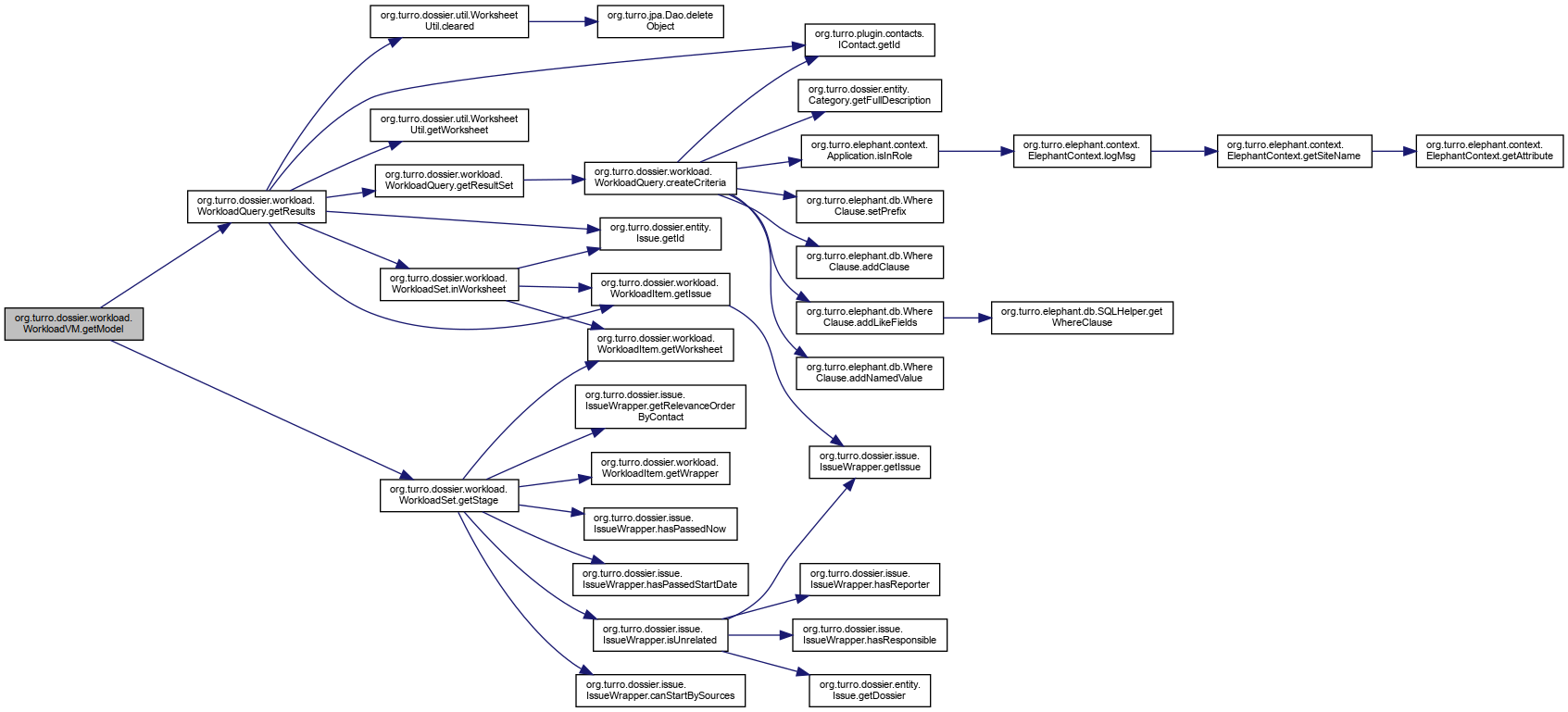- Author
- Lluis Turró Cutiller lluis.nosp@m.@tur.nosp@m.ro.or.nosp@m.g
Definition at line 50 of file WorkloadVM.java.
◆ WorkloadVM()
| org.turro.dossier.workload.WorkloadVM.WorkloadVM |
( |
| ) |
|
◆ addInformation()
| void org.turro.dossier.workload.WorkloadVM.addInformation |
( |
@BindingParam("issue") Issue |
issue | ) |
|
Definition at line 108 of file WorkloadVM.java.
109 DossierMenu.addInformation(issue,
null);
◆ getModel()
| GroupsModel<WorkloadItem, Object, Object> org.turro.dossier.workload.WorkloadVM.getModel |
( |
| ) |
|
Definition at line 160 of file WorkloadVM.java.
161 List<List<WorkloadItem>> data =
new ArrayList<>();
162 List<String> headers =
new ArrayList<>();
163 List<WorkloadItem> loading =
null;
165 IssueStage stage =
null;
169 for(
final WorkloadItem item : ws) {
170 IssueStage current = WorkloadSet.
getStage(item);
171 if(!(current.equals(stage))) {
173 headers.add(stage.toString());
174 loading =
new ArrayList<>();
177 if(loading !=
null) {
182 return new SimpleGroupsModel<>(data, headers);
static IssueStage getStage(WorkloadItem item)
◆ getParticipant()
| IContact org.turro.dossier.workload.WorkloadVM.getParticipant |
( |
| ) |
|
◆ getSearchValue()
| String org.turro.dossier.workload.WorkloadVM.getSearchValue |
( |
| ) |
|
◆ getSelectedCategory()
| Category org.turro.dossier.workload.WorkloadVM.getSelectedCategory |
( |
| ) |
|
◆ getSelectedDossier()
| Dossier org.turro.dossier.workload.WorkloadVM.getSelectedDossier |
( |
| ) |
|
◆ getStatus()
| Set<IssueStatus> org.turro.dossier.workload.WorkloadVM.getStatus |
( |
| ) |
|
◆ getTypes()
| Set<IssueType> org.turro.dossier.workload.WorkloadVM.getTypes |
( |
| ) |
|
◆ selectContact()
| void org.turro.dossier.workload.WorkloadVM.selectContact |
( |
@BindingParam("contact") IContact |
contact | ) |
|
◆ selectEntity()
| void org.turro.dossier.workload.WorkloadVM.selectEntity |
( |
@BindingParam("entity") Object |
entity | ) |
|
Definition at line 74 of file WorkloadVM.java.
75 if(entity instanceof Category) {
78 }
else if(entity instanceof Dossier) {
void setSelectedCategory(Category category)
void setSelectedDossier(Dossier dossier)
◆ setParticipant()
| void org.turro.dossier.workload.WorkloadVM.setParticipant |
( |
IContact |
contact | ) |
|
Definition at line 136 of file WorkloadVM.java.
void setByParticipant(IContact byParticipant)
◆ setSearchValue()
| void org.turro.dossier.workload.WorkloadVM.setSearchValue |
( |
String |
searchValue | ) |
|
◆ setSelectedCategory()
| void org.turro.dossier.workload.WorkloadVM.setSelectedCategory |
( |
Category |
category | ) |
|
◆ setSelectedDossier()
| void org.turro.dossier.workload.WorkloadVM.setSelectedDossier |
( |
Dossier |
dossier | ) |
|
◆ setStatus()
| void org.turro.dossier.workload.WorkloadVM.setStatus |
( |
Set< IssueStatus > |
status | ) |
|
◆ setTypes()
| void org.turro.dossier.workload.WorkloadVM.setTypes |
( |
Set< IssueType > |
types | ) |
|
◆ showAttachments()
| void org.turro.dossier.workload.WorkloadVM.showAttachments |
( |
@BindingParam("issue") Issue |
issue | ) |
|
Definition at line 94 of file WorkloadVM.java.
95 Application app = Application.getApplication();
96 IssueWrapper iw =
new IssueWrapper(issue);
97 if(app.isInRole(
"issue:show") &&
98 (app.isInRole(
"issue:all") || iw.isFullParticipant())) {
99 IssueAttachTree iat =
new IssueAttachTree();
100 iat.setEntity(issue);
101 iat.setChanges(
new Changes());
102 SelectionDialog.showComponent(Framework.getCurrent().getPage(), I_.get(
"Attachments"),
103 iat,
"80%",
"80%",
null);
◆ showInfo()
| void org.turro.dossier.workload.WorkloadVM.showInfo |
( |
@BindingParam("item") WorkloadItem |
item | ) |
|
Definition at line 59 of file WorkloadVM.java.
60 Application app = Application.getApplication();
61 IssueWrapper iw =
new IssueWrapper(item.getIssue());
62 if(app.isInRole(
"issue:show") &&
63 (app.isInRole(
"issue:all") || iw.isFullParticipant())) {
64 DossiersInfo.popup(item.getIssue());
◆ update()
| void org.turro.dossier.workload.WorkloadVM.update |
( |
| ) |
|
The documentation for this class was generated from the following file:

















